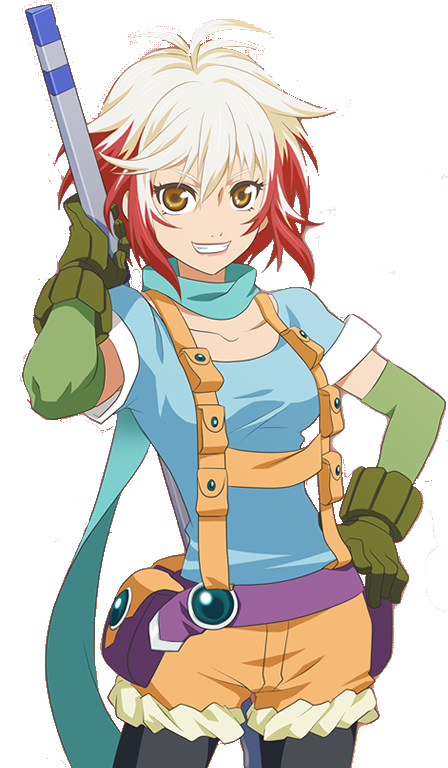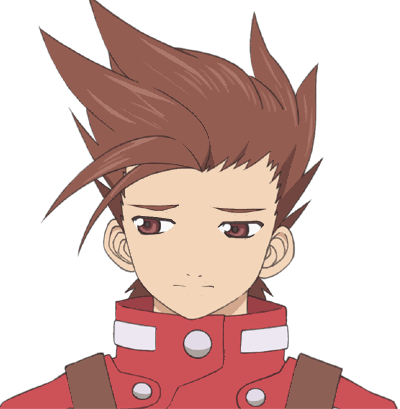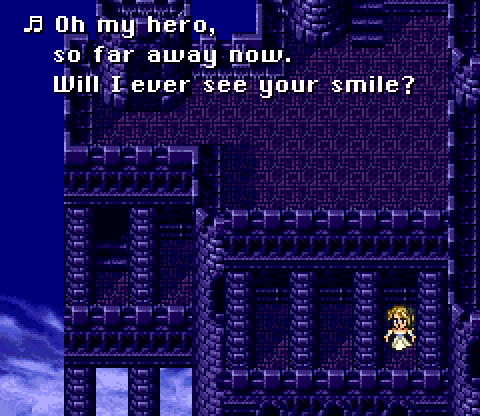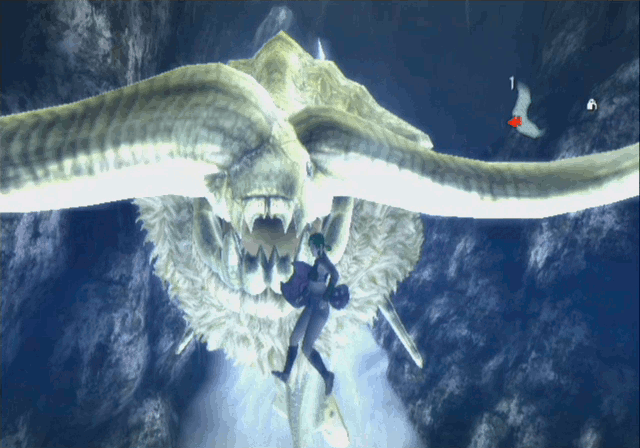Unusual edition today! Didn’t get much accomplished but took a master course in RPG design—in a sense—so this is in blog format below the jump. Lots to say!
Tag Archives: Final Fantasy
Tales of Symphonia Text Review and Story Breakdown: Part 2
Originally a script for a video review, so some parts may stick out and, without visual aids, I recommend having played the game already! Note: this is for the original Tales of Symphonia, so if anything changed in the re-release, I haven’t touched on it here.
Quick links to other entries:
Intro
Part 1
Part 3
Part 4
Part 5
—
—
—
…Where was I again?
Oh, right. “I just believe” isn’t too terrible a response. We all believe in at least a few things we haven’t seen firsthand.
caption: dark matter, string theory, human rights and other Platonic notions of justice or goodness, parallel universes, life on other planets, life at ocean depths that haven’t been visited, animals you’ve never seen, countries you’ve never traveled to, the laws of physics remaining constant tomorrow
And I’ll give credit for not pulling out Pascal’s Wager.

No, not that Pascal. Wrong Tales game!
caption briefly flashed; people will have to pause if they want to read it: In all seriousness, while Pascal’s Wager may be a poor reason for Christian faith because of the specifics of our faith, namely that “I’ll believe just in case lulz” arguably isn’t a belief, it’s a pretty handy tool for probabilistic utilitarians in the tangible world. I don’t know for sure if lead-based paint, cell phone signals, sulfates in shampoo, aspartame in soda, or fluoridated water are harmful or if microwaves really so supercharge the particles inside food that our bodies’ defense systems cease to recognize them as food and begin attacking them like poison or something. I just ask myself what it would cost me to avoid them all and the answer was “not much,” so I kept microwave popcorn and tossed out everything else. No more philosophy in the rest of the videos, promise!
—
—
—
7) It’s Bunglers All The Way Down
The party leaves Palmacosta again, but in their absence, Chocolat’s taken to a human ranch. Everyone agrees to save her, but first they run into the ninja girl again, praying in a church. She gets huffy and flustered while Lloyd and mostly Colette disarm her with kindness and get her name, ![]() Sheena, until she can’t take any more happy power and smoke bombs out again. (Caption: Hopeless Characters: 1)
Sheena, until she can’t take any more happy power and smoke bombs out again. (Caption: Hopeless Characters: 1)
Now off to the ranch. The Governor’s assistant warns everyone they’ve been led into a trap, so Kratos and Raine want to ditch Chocolat and go save the world. Colette vetoes them because she’s the Chosen, and the assistant wants in too. Even though he can’t fight [Hopeless Characters: 2], Lloyd’s like yeah, sure, because no one knows as much as him about being told you’re worthless.

What’s In A (Changed For Localization) Name?
Of all the decisions that game developers and publishers make, none baffles me more than changing names for change’s own sake during localization. Altering a creator’s work requires justification: the name “Tina” in Final Fantasy VI was intended to sound foreign and mysterious to Japanese audiences but wouldn’t have that effect in North America, so it was changed to “Terra.” People can debate the legitimacy of the reasoning behind that change and explain why they don’t believe it was necessary, especially with the benefit of hindsight; they might say that names like Mario, Luigi, Link, and Cloud are universal, that the name “Cid” is a constant in the Final Fantasy series, or that Tales games regularly use names like Natalia, Chester, Lloyd, and Rita for both English and Japanese with few fan complaints. What no one can argue is the fact that reasoning for the name Terra existed. Thought went into it and so I don’t dispute her name change.

On the far opposite end is the inconsistency of Pokémon naming. For the most part, the series localizes names so that whether English-speaking players are six or sixty, they know that a Bulbasaur is a dinosaur with a bulb. However, the name Pikachu carried over along with other names and portmanteaus like Jirachi, Rayquaza, Lucario, and Pachirisu. The question is why they didn’t change and the answer is—a mystery.


Just as much of a mystery is why Japanese names that would already make sense to English speakers sometimes get changed. Above are a chinchilla Pokémon and its evolution, known as Chillarmy and Chillaccino in the Japanese games, but as Minccino and Cinccino in the English games. The question isn’t whether the changed names are good or bad, but why the changed names are. If anything, “Chillarmy” is likely more easy to pronounce for nine-year-old native English speakers than “Minccino”.

The Final Fantasy VI opera scene: my proof positive that nostalgia has little hold over me. I only needed one look at the GBA version to throw the above lyrics out of my heart.
“Because we can” is a poor argument to change lines—after all, you “can” also not change them—but I’m not a purist. I have my preferences only independently of faithfulness to the original. I don’t know or care which version of Dragon Quest IV is closer to the original, but I do know that I prefer the NES localization over the DS re-localization. I also know that, with only a couple of exceptions, I prefer the SNES localization of Final Fantasy VI over the GBA re-localization that Square-Enix certainly stated was more faithful.
Above all, I believe one thing about localizations: that they should see their ideas through. I may not like the all-over-the-map accents of Dragon Quest IV, but I admire that the team had a vision and ran with it to the greatest extent. Even though I didn’t like it once, that same willingness to change things worked wonders for me with Dragon Quest IX‘s alliteration-rich translation. If Cherry Tree High Comedy Club went all the way to whitewash every Japan-related reference out of the dialogue, I wouldn’t have liked that decision but I could at least say that it wasn’t a house divided. If only legendary Pokémon kept Japanese names and the names of ordinary Pokémon always changed, there would be a certain clarity to the series’ naming conventions.
Just as every spell or special move should be created with a purpose, every word in a game script should be put in with a purpose—and that holds true whether the word is being written on a blank sheet or translated from another language.
May the Fear Be With You
Your average gamer doesn’t break a sweat upon seeing a Balrog in Moria; we’ve been slaying giants for so long that it might as well be a rabid bunny. There’s no sense of fear—not from appearance alone. Titles don’t convey power either; Dragon Quest VI features Mortamor, the King of Demons, but who shudders at his name without personally battling him? No one. Your average gamer hears “King of Demons” and says “Oh, please.” DQVI and Dragon Quest IX themselves make sure that he’s no big deal by introducing a bigger and badder dude who mocks the poor sap. Direct quote from DQIX describing one of the bonus bosses:
“Brutal bad-dream demon from another dimension. So strong that he makes Mortamor seem more like Snoretamore!”


Dialga and Palkia may be capable of destroying the world, but breaking out of a tiny ball is a tough order.
After killing Death a dozen times in Castlevania and enslaving creatures who control time and space in Pokémon, we’re all Gimli from DM of the Rings. We see an elder dragon the size of a whale and our first thought isn’t “AAAHHH!!!” It’s more like “you’re going down” or “huh, pretty cool-looking dragon” or “I’ve seen better.” Or maybe it’s something else entirely.

A monster hunter takes a dive in her best swimsuit only to swim across the Ceadeus. Not pictured: shortly afterward, she shrugged and continued enjoying her tropical vacation.
A monster can be memorable simply for its size, but imposing fear on players requires substance. Just like movies, stories, and plays teach the audience what to expect as they go along—a comedy usually opens with humor and makes minimal use of dramatic moments; a drama does the opposite—the challenge in a game directs players’ expectations. A monster’s real fear factor is rooted in gameplay.
You're brave enough to keep reading. I can see it in your eyes.
RPGs: More Like Movies… or Novels?
Gamers occasionally cry foul on non-interactive cutscenes, saying that developers are emulating movies instead of synthesizing stories with the unique qualities of games. Whether a player likes non-interactivity is a matter of taste. I’m here to question a matter of fact: whether movies are the closest comparison point. I could weigh this out for most game genres—even first-person shooters borrow ideas from cinematography—but I’ll stick to RPGs because they use the same easy-to-reference measure of length that screenplays and novels do: word count.
Movies usually have to fit into two and a half hours, so they need to make the best of every minute. Dialogue stays brief; action moves quickly; camera shots linger long enough but not a moment longer. This is part of the reason that directors typically cut novel content when translating written words onto the big screen. Novels have a certain leeway for wordiness because people have varying reading speeds, but quality movies, like poems, waste no motion. With that in mind, I pasted ten RPG scripts into Microsoft Word for length comparisons and here’s what I found:
- Final Fantasy IV (1991): ~24,000 words
- Secret of Mana (1993): ~14,000 words
- Final Fantasy VI Advance (original game 1994): ~25,000 words
- EarthBound (1995): ~16,000 words
- Final Fantasy Tactics (1998): ~39,000 words
- Final Fantasy X (2001): ~43,000 words
- Star Ocean: Till the End of Time (2004): ~78,000 words
- Final Fantasy XII (2006): ~52,000 words
- Tales of the Abyss skits (2006): ~60,000 words (this is only the optional dialogue!)
- The World Ends With You (2008): ~69,000 words (not counting Another Day but counting other optional party dialogue)
Some fairly recent RPGs double or triple the amount of spoken dialogue over the RPGs of yesteryear. The limited amount of space on Super Nintendo cartridges served the same role as run time does for movies, forcing the story to stay snappy, but discs buried that issue so that RPG stories could let it all hang out. This isn’t a guaranteed positive and can allow for the bad kind of fluff and filler to settle in, but it also allows for worlds where not every character is a quick-witted, cut-to-the-chase speaker who delivers lightning-paced lines in high tempo. Less isn’t always more.
Recent RPG stories have longer build, allowing themselves time for more scenes in which “nothing happens” in the sense that characters have subtle emotional shifts but don’t take physical actions to advance the story. Old-school RPGs use swifter action-oriented structures that don’t tolerate delays between plot points. Neither is inherently better nor worse, but the approaches remain different—and as counterintuitive as it may sound, old-school RPGs might have more in common with movies than modern RPGs do.
Just something to think about.
